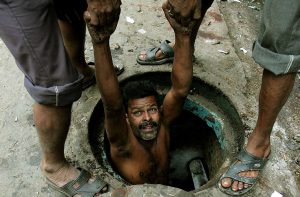Supreme Court issues fresh directions for implementation of Manual Scavenging Act

The Supreme Court has directed the implementation of the Prohibition of Employment as Manual Scavengers and their Rehabilitation Act, 2013 and the Employment of Manual Scavengers and Construction of Dry Latrines (Prohibition) Act, 1993.
A Bench of Justice S Ravindra Bhat and Dipankar Datta have appointed Advocate K Parameshwar as the Amicus Curiae in the matter.
The Central Government was told that incase of respondents it shall place have to keep a record of the steps taken after the judgment of this Court, viz.-a-viz.
It was also instructed to keep record of the Status of implementation of the 2013 Act i.e. Prohibition of Employment as Manual Scavengers and their Rehabilitation Act, including the steps towards rehabilitation of such persons falling within the definition of ‘Manual Scavengers’.
The order also asked for record of steps that have been taken towards abolition/demolition of Dry Latrines, in different states along with the details of status of Dry Latrines and Safai Karamcharies in Cantonment Boards and Railways.
The Central Government has been asked to provide details on the Employment of Safai Karamcharies in Railways and Cantonments Boards whether recruited directly or indirectly i.e. through Contractors or otherwise.
A note on Statewise set up of Municipal Corporation and the nature of equipment (as well as the description of technical equipment), deployed by such bodies to mechanize sewage cleaning was asked.
Another prominent question raised was on the the feasibility of developing internet based solutions for real time tracking of sewage deaths and action taken by their concerned authorities including the appropriate Government towards payment of compensation and rehabilitation of families.
The Union Ministry of Social Justice and Empowerment has been asked to file on record an affidavit containing information on these issues within six weeks.
The matter will be taken up next on April 12, 2023.
The National Commission for Safai Karamcharis, the National Commission for Scheduled Castes, and the National Commission for Scheduled Tribes were added as respondents.
The petition was filed by Dr Balram Singh in person, who had sought directions for implementation of the two Acts.
The Supreme Court referred to its decision in Safai Karamchari Andolan And Others v. Union of India And Others, where among other things, the Court had asked for rehabilitation, cash assistance, and residential plots for existing manual scavengers.
The Court had also asked for Stipends to be provided to their families so they could be trained in alternative professions, and the government was asked to identify and phase out the practice from railway tracks.
The government had also directed for issue of₹10 lakh compensation to the next of kin in such cases, and make it illegal to enter sewers without safety equipment.
While giving an answer during the Rajya Sabha, the Union Ministry of Social Justice and Empowerment in July 2021 said that no deaths have been reported due to manual scavenging in the last five years.
What is however interesting is that at least three High Courts in the country – namely Karnataka, Orissa and Madras – were hearing cases related to manual scavenging, and deaths of people who entered manholes to clean them.
The post Supreme Court issues fresh directions for implementation of Manual Scavenging Act appeared first on India Legal.
from India Legal https://ift.tt/oJHuYEr